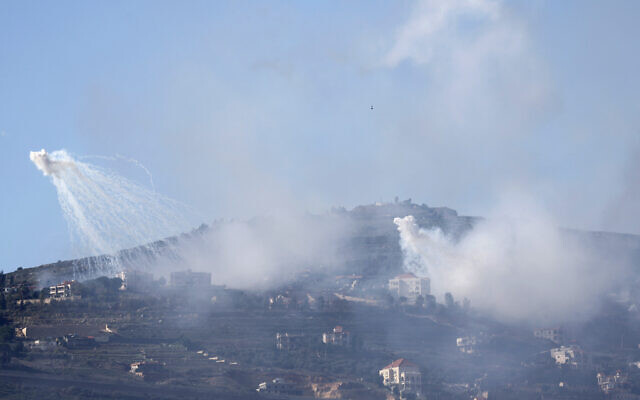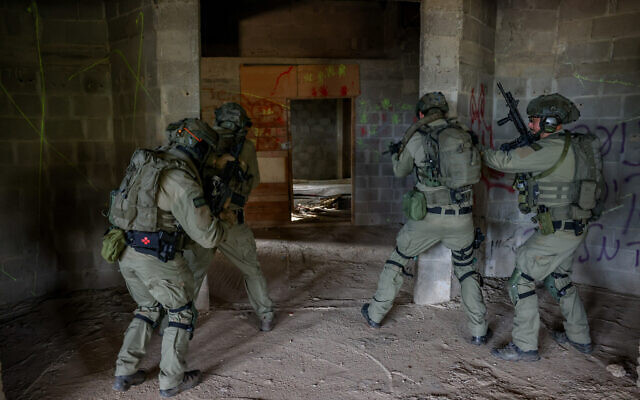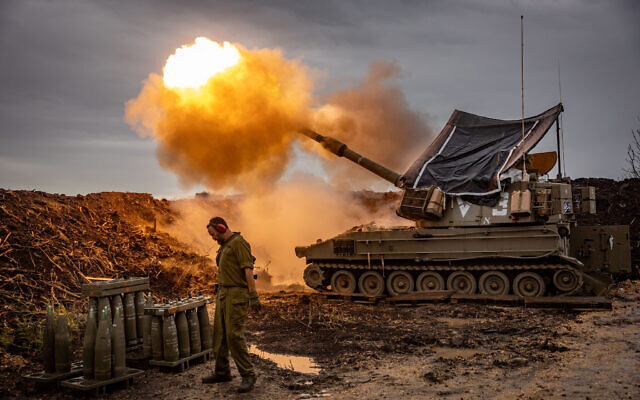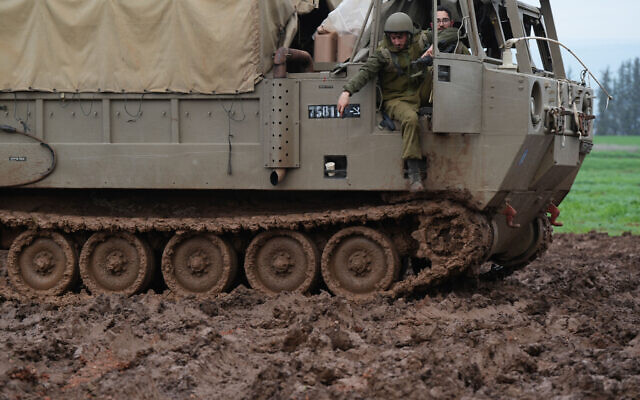https://www.timesofisrael.com/visit...ays-war-in-lebanon-becoming-much-more-likely/
The likelihood that Israel will be drawn into a war in Lebanon is growing, IDF Chief of Staff Lt. Gen. Herzi Halevi said Wednesday, hours after Hamas terrorists fired a barrage of rockets at a northern Israel town.
With visiting troops drilling for a simulated offensive inside Lebanon, as the army winds down its most intense stages of fighting in Gaza, Halevi said Israel was “increasing readiness for fighting in Lebanon,” as it seeks to stabilize its northern border and allow tens of thousands of Israelis evacuated from the region to return home.
The IDF has “a very clear goal in Lebanon — to return the residents to the north, all the communities in the north,” Halevi said.
Sheba Medical Center during Iron Swords WarKeep Watching
“I don’t know when the war in the north is,” he added. “I can tell you that the likelihood of it happening in the coming months is much higher than it was in the past.”
He added that Israel would apply lessons it had learned from fighting in Gaza, should it embark on a campaign to push the Hezbollah terror group and others threatening Israel away from the border.
"We have a lot of lessons from the fighting in Gaza. Many of them are very relevant to fighting in Lebanon,” he said.

This picture taken from an Israeli position along the border with southern Lebanon shows smoke billowing above the Lebanese village of Adayseh during Israeli bombardment on January 14, 2024. (jalaa marey / AFP)
Wednesday saw fresh bouts of cross-border fire, including a volley of some 20 rockets fired at the seaside border village of Rosh Hanikra in the afternoon, ending a rare period of some 24 hours in which no rockets were fired at Israel from Gaza, Lebanon or elsewhere.
No damage resulted from the rocket fire, with projectiles either being intercepted or falling in open areas. The attack was claimed by Hamas, which maintains a presence in Lebanon under Hezbollah protection.
A short while after the barrage, the IDF said it had struck the group that launched the rockets from southern Lebanon, and Hamas claimed responsibility, saying that its Lebanon branch launched the attacks and that one Hamas fighter was killed in the retaliatory IDF strike.
A second round of alerts a short while later were determined to be false alarms.
In addition to the rocket sirens, hostile aircraft invasion alarms sounded across several northern communities later on Wednesday afternoon, in an event which the Home Front Command said ended a short while later, and did not elaborate further.

Israeli reserve soldiers of the IDF Devorah Unit, seen during a training session at the Northern Israeli border with Lebanon. January 16, 2024. (David Cohen/Flash90)
The IDF carried out airstrikes against Hezbollah targets in Lebanon throughout the day on Wednesday. Sites hit by fighter jets included military buildings and other terror infrastructure, the IDF said, while tank troops shelled an area in Ayta ash-Shab, and artillery shelled an area in Dhayra, to “remove threats.”
As a result of the incessant fighting, an estimated 80,000 people from the north have been displaced, some evacuating due to government orders and others due to their own concerns, with no way of knowing when they will be able to return home.
Since October 8, one day after the deadly Hamas massacres in southern Israel in which some 1,200 people were slaughtered and around 240 others were taken hostage, the Iran-backed Hezbollah has engaged in cross-border fire on a near-daily basis, launching rockets, drones and missiles at northern Israel.
The likelihood that Israel will be drawn into a war in Lebanon is growing, IDF Chief of Staff Lt. Gen. Herzi Halevi said Wednesday, hours after Hamas terrorists fired a barrage of rockets at a northern Israel town.
With visiting troops drilling for a simulated offensive inside Lebanon, as the army winds down its most intense stages of fighting in Gaza, Halevi said Israel was “increasing readiness for fighting in Lebanon,” as it seeks to stabilize its northern border and allow tens of thousands of Israelis evacuated from the region to return home.
The IDF has “a very clear goal in Lebanon — to return the residents to the north, all the communities in the north,” Halevi said.
Returning to LifeKeep Watching
“I don’t know when the war in the north is,” he added. “I can tell you that the likelihood of it happening in the coming months is much higher than it was in the past.”
He added that Israel would apply lessons it had learned from fighting in Gaza, should it embark on a campaign to push the Hezbollah terror group and others threatening Israel away from the border.
Get The Times of Israel's Daily Edition by email and never miss our top stories
Newsletter email address
By signing up, you agree to the terms
“We have a lot of lessons from the fighting in Gaza. Many of them are very relevant to fighting in Lebanon,” he said.

This picture taken from an Israeli position along the border with southern Lebanon shows smoke billowing above the Lebanese village of Adayseh during Israeli bombardment on January 14, 2024. (jalaa marey / AFP)
Wednesday saw fresh bouts of cross-border fire, including a volley of some 20 rockets fired at the seaside border village of Rosh Hanikra in the afternoon, ending a rare period of some 24 hours in which no rockets were fired at Israel from Gaza, Lebanon or elsewhere.
No damage resulted from the rocket fire, with projectiles either being intercepted or falling in open areas. The attack was claimed by Hamas, which maintains a presence in Lebanon under Hezbollah protection.
Advertisement
A short while after the barrage, the IDF said it had struck the group that launched the rockets from southern Lebanon, and Hamas claimed responsibility, saying that its Lebanon branch launched the attacks and that one Hamas fighter was killed in the retaliatory IDF strike.
A second round of alerts a short while later were determined to be false alarms.
In addition to the rocket sirens, hostile aircraft invasion alarms sounded across several northern communities later on Wednesday afternoon, in an event which the Home Front Command said ended a short while later, and did not elaborate further.

Israeli reserve soldiers of the IDF Devorah Unit, seen during a training session at the Northern Israeli border with Lebanon. January 16, 2024. (David Cohen/Flash90)
The IDF carried out airstrikes against Hezbollah targets in Lebanon throughout the day on Wednesday. Sites hit by fighter jets included military buildings and other terror infrastructure, the IDF said, while tank troops shelled an area in Ayta ash-Shab, and artillery shelled an area in Dhayra, to “remove threats.”
As a result of the incessant fighting, an estimated 80,000 people from the north have been displaced, some evacuating due to government orders and others due to their own concerns, with no way of knowing when they will be able to return home.
Since October 8, one day after the deadly Hamas massacres in southern Israel in which some 1,200 people were slaughtered and around 240 others were taken hostage, the Iran-backed Hezbollah has engaged in cross-border fire on a near-daily basis, launching rockets, drones and missiles at northern Israel.
Advertisement
Figures shared by the IDF on the 100th day of war showed that in the months since October 7, more than 2,000 projectiles have been launched by Hezbollah and armed Palestinian groups along the Lebanon border.
Since the start of the war in Gaza, Israel has acknowledged the high likelihood of a subsequent war on the northern borders and has vowed not to be taken by surprise again, as it was on October 7.

Israeli artillery unit firing shells toward Lebanon from northern Israel on January 15, 2024. (Yonatan Sindel/Flash90)
The country’s political and military leaders have repeatedly stated that Hezbollah will have to withdraw its forces from the border area to north of the Litani River, as required by 2006’s UN Resolution 1701, and that either this will be achieved diplomatically or by force.
Hezbollah leader Hassan Nasrallah has claimed in response that the violence along the Lebanon border is connected to the war in Gaza, and that Israel is seeking to launch a war on Lebanon.
He has threatened on more than one occasion to make Israel “pay the price” for both the war against Hamas in Gaza and for the skirmishes in the north but has stopped short of launching a full-scale war.
In turn, Israel has contained fighting against the group to areas close to the border, but the clashes have still resulted in deaths on both sides.

Israeli soldiers seen at their artillery units near the border with Lebanon, northern Israel, January 17, 2024. (Ayal Margolin/Flash90)
Six civilians have been killed on the Israeli side, including a septuagenarian and her son, who died this week when an anti-tank missile slammed into their home in Kfar Yuval. In addition to the civilian deaths, nine IDF soldiers and reservists have also been killed.
Across the border, Hezbollah has named 162 members who have been killed by the ongoing skirmishes, mostly in Lebanon although some also in Syria. An additional 20 operatives from other terror groups in Lebanon have also been killed, as well as 19 civilians, three of whom were journalists.
International figures, including US special envoy Amos Hochstein and Secretary of State Antony Blinken, have been dispatched to the region in recent weeks in an attempt to cool the boiling tensions along the Israel-Lebanon border, but seemingly to no avail, with Israel refusing to back down as long there is still a clear and present threat to the country’s northern residents.
The likelihood that Israel will be drawn into a war in Lebanon is growing, IDF Chief of Staff Lt. Gen. Herzi Halevi said Wednesday, hours after Hamas terrorists fired a barrage of rockets at a northern Israel town.
With visiting troops drilling for a simulated offensive inside Lebanon, as the army winds down its most intense stages of fighting in Gaza, Halevi said Israel was “increasing readiness for fighting in Lebanon,” as it seeks to stabilize its northern border and allow tens of thousands of Israelis evacuated from the region to return home.
The IDF has “a very clear goal in Lebanon — to return the residents to the north, all the communities in the north,” Halevi said.
Sheba Medical Center during Iron Swords WarKeep Watching
“I don’t know when the war in the north is,” he added. “I can tell you that the likelihood of it happening in the coming months is much higher than it was in the past.”
He added that Israel would apply lessons it had learned from fighting in Gaza, should it embark on a campaign to push the Hezbollah terror group and others threatening Israel away from the border.
"We have a lot of lessons from the fighting in Gaza. Many of them are very relevant to fighting in Lebanon,” he said.

This picture taken from an Israeli position along the border with southern Lebanon shows smoke billowing above the Lebanese village of Adayseh during Israeli bombardment on January 14, 2024. (jalaa marey / AFP)
Wednesday saw fresh bouts of cross-border fire, including a volley of some 20 rockets fired at the seaside border village of Rosh Hanikra in the afternoon, ending a rare period of some 24 hours in which no rockets were fired at Israel from Gaza, Lebanon or elsewhere.
No damage resulted from the rocket fire, with projectiles either being intercepted or falling in open areas. The attack was claimed by Hamas, which maintains a presence in Lebanon under Hezbollah protection.
A short while after the barrage, the IDF said it had struck the group that launched the rockets from southern Lebanon, and Hamas claimed responsibility, saying that its Lebanon branch launched the attacks and that one Hamas fighter was killed in the retaliatory IDF strike.
A second round of alerts a short while later were determined to be false alarms.
In addition to the rocket sirens, hostile aircraft invasion alarms sounded across several northern communities later on Wednesday afternoon, in an event which the Home Front Command said ended a short while later, and did not elaborate further.

Israeli reserve soldiers of the IDF Devorah Unit, seen during a training session at the Northern Israeli border with Lebanon. January 16, 2024. (David Cohen/Flash90)
The IDF carried out airstrikes against Hezbollah targets in Lebanon throughout the day on Wednesday. Sites hit by fighter jets included military buildings and other terror infrastructure, the IDF said, while tank troops shelled an area in Ayta ash-Shab, and artillery shelled an area in Dhayra, to “remove threats.”
As a result of the incessant fighting, an estimated 80,000 people from the north have been displaced, some evacuating due to government orders and others due to their own concerns, with no way of knowing when they will be able to return home.
Since October 8, one day after the deadly Hamas massacres in southern Israel in which some 1,200 people were slaughtered and around 240 others were taken hostage, the Iran-backed Hezbollah has engaged in cross-border fire on a near-daily basis, launching rockets, drones and missiles at northern Israel.
The likelihood that Israel will be drawn into a war in Lebanon is growing, IDF Chief of Staff Lt. Gen. Herzi Halevi said Wednesday, hours after Hamas terrorists fired a barrage of rockets at a northern Israel town.
With visiting troops drilling for a simulated offensive inside Lebanon, as the army winds down its most intense stages of fighting in Gaza, Halevi said Israel was “increasing readiness for fighting in Lebanon,” as it seeks to stabilize its northern border and allow tens of thousands of Israelis evacuated from the region to return home.
The IDF has “a very clear goal in Lebanon — to return the residents to the north, all the communities in the north,” Halevi said.
Returning to LifeKeep Watching
“I don’t know when the war in the north is,” he added. “I can tell you that the likelihood of it happening in the coming months is much higher than it was in the past.”
He added that Israel would apply lessons it had learned from fighting in Gaza, should it embark on a campaign to push the Hezbollah terror group and others threatening Israel away from the border.
Get The Times of Israel's Daily Edition by email and never miss our top stories
Newsletter email address
By signing up, you agree to the terms
“We have a lot of lessons from the fighting in Gaza. Many of them are very relevant to fighting in Lebanon,” he said.

This picture taken from an Israeli position along the border with southern Lebanon shows smoke billowing above the Lebanese village of Adayseh during Israeli bombardment on January 14, 2024. (jalaa marey / AFP)
Wednesday saw fresh bouts of cross-border fire, including a volley of some 20 rockets fired at the seaside border village of Rosh Hanikra in the afternoon, ending a rare period of some 24 hours in which no rockets were fired at Israel from Gaza, Lebanon or elsewhere.
No damage resulted from the rocket fire, with projectiles either being intercepted or falling in open areas. The attack was claimed by Hamas, which maintains a presence in Lebanon under Hezbollah protection.
Advertisement
A short while after the barrage, the IDF said it had struck the group that launched the rockets from southern Lebanon, and Hamas claimed responsibility, saying that its Lebanon branch launched the attacks and that one Hamas fighter was killed in the retaliatory IDF strike.
A second round of alerts a short while later were determined to be false alarms.
In addition to the rocket sirens, hostile aircraft invasion alarms sounded across several northern communities later on Wednesday afternoon, in an event which the Home Front Command said ended a short while later, and did not elaborate further.

Israeli reserve soldiers of the IDF Devorah Unit, seen during a training session at the Northern Israeli border with Lebanon. January 16, 2024. (David Cohen/Flash90)
The IDF carried out airstrikes against Hezbollah targets in Lebanon throughout the day on Wednesday. Sites hit by fighter jets included military buildings and other terror infrastructure, the IDF said, while tank troops shelled an area in Ayta ash-Shab, and artillery shelled an area in Dhayra, to “remove threats.”
As a result of the incessant fighting, an estimated 80,000 people from the north have been displaced, some evacuating due to government orders and others due to their own concerns, with no way of knowing when they will be able to return home.
Since October 8, one day after the deadly Hamas massacres in southern Israel in which some 1,200 people were slaughtered and around 240 others were taken hostage, the Iran-backed Hezbollah has engaged in cross-border fire on a near-daily basis, launching rockets, drones and missiles at northern Israel.
Advertisement
Figures shared by the IDF on the 100th day of war showed that in the months since October 7, more than 2,000 projectiles have been launched by Hezbollah and armed Palestinian groups along the Lebanon border.
Since the start of the war in Gaza, Israel has acknowledged the high likelihood of a subsequent war on the northern borders and has vowed not to be taken by surprise again, as it was on October 7.

Israeli artillery unit firing shells toward Lebanon from northern Israel on January 15, 2024. (Yonatan Sindel/Flash90)
The country’s political and military leaders have repeatedly stated that Hezbollah will have to withdraw its forces from the border area to north of the Litani River, as required by 2006’s UN Resolution 1701, and that either this will be achieved diplomatically or by force.
Hezbollah leader Hassan Nasrallah has claimed in response that the violence along the Lebanon border is connected to the war in Gaza, and that Israel is seeking to launch a war on Lebanon.
He has threatened on more than one occasion to make Israel “pay the price” for both the war against Hamas in Gaza and for the skirmishes in the north but has stopped short of launching a full-scale war.
In turn, Israel has contained fighting against the group to areas close to the border, but the clashes have still resulted in deaths on both sides.

Israeli soldiers seen at their artillery units near the border with Lebanon, northern Israel, January 17, 2024. (Ayal Margolin/Flash90)
Six civilians have been killed on the Israeli side, including a septuagenarian and her son, who died this week when an anti-tank missile slammed into their home in Kfar Yuval. In addition to the civilian deaths, nine IDF soldiers and reservists have also been killed.
Across the border, Hezbollah has named 162 members who have been killed by the ongoing skirmishes, mostly in Lebanon although some also in Syria. An additional 20 operatives from other terror groups in Lebanon have also been killed, as well as 19 civilians, three of whom were journalists.
International figures, including US special envoy Amos Hochstein and Secretary of State Antony Blinken, have been dispatched to the region in recent weeks in an attempt to cool the boiling tensions along the Israel-Lebanon border, but seemingly to no avail, with Israel refusing to back down as long there is still a clear and present threat to the country’s northern residents.
